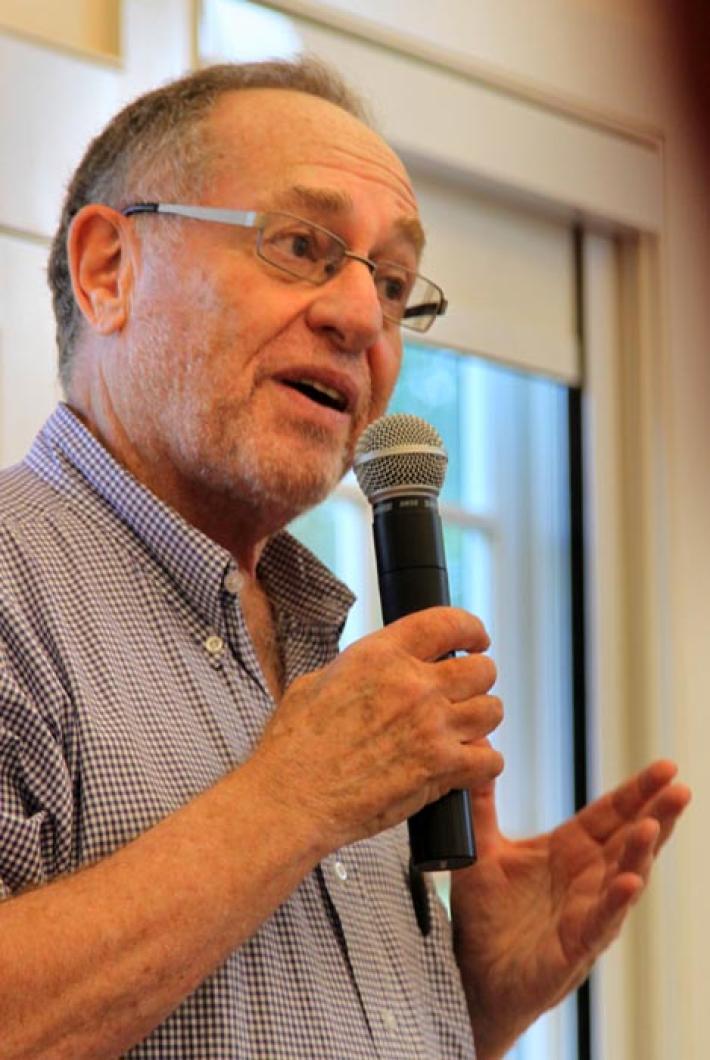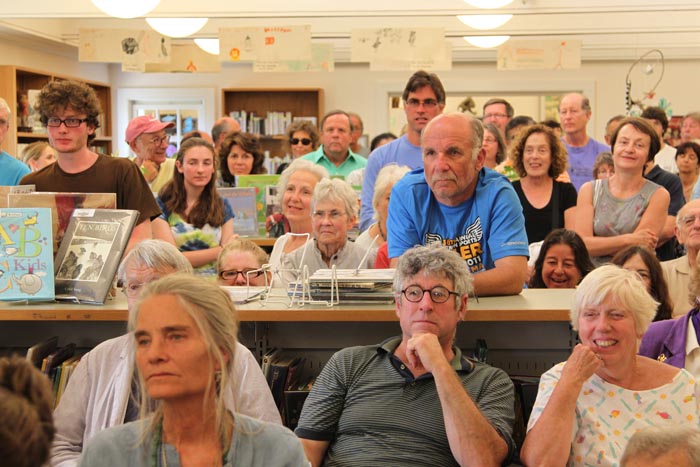The overflow crowd gathered at the Chilmark Public Library to hear renowned Harvard law professor Alan Dershowitz on Wednesday evening did not know it going in, but they were about to hear from an indicted felon.
An international criminal, if you will, for his offense was not committed in this country but in Italy.
In summary, the circumstances are these: Several years ago an Italian newspaper contacted him, seeking his views on an Italian judge who had freed a group of terrorists, on the basis that they were actually “freedom fighters.”
Mr. Dershowitz, in his Massachusetts office, read the judgment and considered it an outrage, a “Magna Carta for terrorists.” He conveyed this view to La Stampa, which published it, and he was, as a result, indicted.
In Italy, you cannot criticize a judge.
And that was the point of the story; in this country you can, thanks to the protections of free speech Americans enjoy under the First Amendment to the Constitution.
That was the advertised topic of his address, the First Amendment, From the Pentagon Papers to WikiLeaks.
Although it strayed into times long before the 1971 publication of the Pentagon Papers, and (under audience questioning) onto other Constitutional amendments as high as number 15, the main focus was on what Mr. Dershowitz considers the most important amendment, and the continuing battle to protect it from those, particularly in government, who would constrain it.
He not only illustrated his arguments with numerous stories, but exercised the right freely throughout his speech, offering frank assessments of various people, from pro-gun movie star Charlton Heston to noted journalists to legal and political figures up to and including current members of the U.S. Supreme Court.
Suffice to say he is troubled by the overwhelmingly conservative leanings of the current court, and particularly critical of two justices, Clarence Thomas and Antonin Scalia.
Along the way Mr. Dershowitz also expressed strong views about controversial social issues.
He recalled, for example, his first First Amendment case, defending the man who was arrested for screening, at Boston’s Symphony Theater, the 1967 film I Am Curious (Yellow), which was deemed obscene because of sexual content which today would be considered very mild.
His defense was novel. It was not that the film was not obscene, but that it was being shown to adults who had been adequately warned what to expect, in a closed theater, and that the state therefore had no right to interfere.
He won the early rounds of the case and his success, he said, made him “a hero to the porn business” and a target of feminists.
Ultimately the case went to the Supreme Court, which rejected the principle of the defense. In the court of public opinion, however, the case had been won in the decades since, he said.
“Turn on any television set today, go to any movie house. Are there laws regulating obscenity? Of course not. You can see anything” he said
“So one basis for restricting speech — offensiveness — is now really off the table.”
Mr. Dershowitz said he was sympathetic to people who were offended — he himself would not choose to see some of the things he has defended — but he argued those feminists who are convinced that pornography leads to crimes against women were wrong.
“We have one of the best natural experiments in the word to disprove that. At the very time pornography has become completely pervasive in America, rates of rape have gone down dramatically. And at the very same time, in those countries which ban all pornography and obscenity, rates of rape and violence against women have gone up,” he said.
A more serious free speech issue, however, is that of disclosure of state secrets. Democracy could function largely unhindered without pornography, but could be seriously compromised if it got the balance wrong on government secrecy.
And he made a strong case that the balance is wrong now in this country, and that “the vast majority of classified material is improperly classified and has no basis in secrecy whatsoever.” The only basis for most of it is to protect the reputations of current and former office holders, he said.
He cited the case of the Pentagon Papers to make the point.
The Pentagon Papers were a study secretly prepared by the Department of Defense which showed the Administration had systematically lied to the public and Congress about the Viet Nam War. The study was leaked to the media and the federal government tried to stop publication.
“The United States Government said, essentially, that the government would fall it could not continue to govern if the Pentagon Papers were revealed,” he said.
“And of course, as you know the Pentagon Papers were published by the very courageous New York Times and Washington Post, and no damage was done.”
Just a few months ago, he noted, the whole of the papers were officially released, with just 11 words redacted.
“And everybody’s playing the parlor game of which 11 words. We think it was probably something that disclosed ... a certain radio frequency that was used to monitor North Korean ships may have been inadvertently included.”
And the disclosure of such information — likewise disclosing the identities of spies or informants, weapons systems and troop movements — was “a real, real problem,” he said.
But it was equally consequential for democracy when material was withheld unnecessarily.
Another example was the vast amount of material leaked to WikiLeaks about the conduct of America’s current wars and its diplomatic activities, which also had done no real damage to America, and had helped start the uprising which began in Tunisia and now has spread across other Arab nations.
Mr. Dershowitz outlined how WikiLeaks differed from more conventional modes of media, by reference to two of America’s most respected journalists, Seymour Hersh and Bob Woodward.
Mr. Hersh, he said, operated by developing contacts among government officials who disagree with government policy, and winning their trust to get material.
“Bob Woodward is very different. He goes to the very top, and says ‘Look, I am writing a book. It’s going to be a bestseller. You’ve got two options . . . you will come out looking good, or don’t be a source and you won’t come out looking credible.’
“If you want to know the sources in a Bob Woodward book, just read the book and see who comes out looking good,” he said.
But both Hersh and Woodward knew where their information had come from. Julian Assange, the founder of WikiLeaks, was different again. He had set up a system whereby people could leak material so even he did not know the source.
Mr. Dershowitz believes the WikiLeaks material that has made its way into the public domain, redacted of genuinely sensitive information both by Mr. Assange and his colleagues and by the newspapers to which he leaked it, did no damage to national security.
He said he had been contacted by Mr. Assange, fearful that he might be brought to the United States to face prosecution under the Espionage Act, which the lawyer characterized as “one of the broadest anti-free speech statutes imaginable.”
If it chose, Mr. Dershowitz said, the government could invoke the act against the New York Times, the Washington Post, Hersh, Woodward and countless others because the Espionage Act “simply provides that you cannot publish any classified material, no matter how you got it.”
The reason successive governments had chosen not to do that, he suggested, was that there were other ways in which these media could be controlled to some extent.
“The reason the government is so anxious to indict Julian Assange is that they can’t control him,” he said.
His greatest concern about a law “so broad almost anybody can be prosecuted” was that government could resort to selective use of it.
Thus, they would not “go after the big names, but will go after marginal press” and the unpopular, he said.
If Mr. Assange were indicted, Mr. Dershowitz said, he would make that argument “in the strongest way.”
What the country really needed is a new statute, which sets out clearly what can and cannot be published, he said.
For, as things now stand, much of what governments keep secret and what leaks like the Pentagon Papers and WikiLeaks documents reveal, is simply “the foolishness of our leaders.”






Comments
Comment policy »